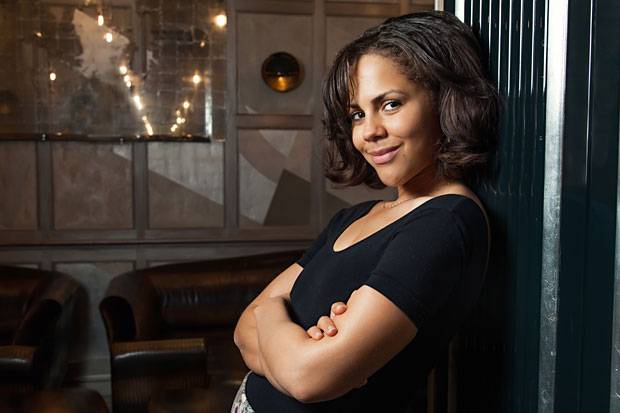Lenora Crichlow takes the lead in new Olympic Games-inspired British movie 'Fast Girls'. The Evening Standard sat down with the actress to talk about her experience shooting the physically demanding film, her activist father Frank Critchlow and her thoughts on being told that she is the first black female actor to lead in a British film. While the social media comments have disputed this supposed fact (Zawe Ashton in 'Dreams of a Life', Marianne Jean-Baptiste in 'Secrets and Lies', Suzette Llewellyn in 'Welcome II the Terrordome', Cassie MacFarlane in Burning an Illusion), Lenora does make some interesting comments about the lack of leading ladies of colour on our screens.
Reposted from The Evening Standard.
With its asphalt-pounding grit and a urban soundtrack, Fast Girl looks set to follow the success of London-made films such as Street Dance 3D and Kidulthood and capitalise on Olympic fever. That's partly due to a writing team including playwright Roy Williams, Jay Basu and actor Noel Clarke – who also plays a world-weary athletics coach. Mostly, however, it's down to Crichlow.
The 27-year-old actress from Harlesden is best known for playing Annie in the supernatural sitcom Being Human. She not only brings an underdog's steeliness to the role of Shania, she had to train to near-Olympic levels of fitness to do so. There are plenty of lingering shots of tight stomachs and taut quadriceps to emphasise the work that she and her co-stars put in.
"The first couple of sessions were hell!" she recalls when we meet at the Connaught in Mayfair. Smart, funny and fast-talking, she has the presence of an athlete and the glow of someone who has just been for a run. "When you first go into a cardio session, for the first five, six minutes, your body's going: ‘Excuse me? What are you doing?' And then once you get used to it, it's like: ‘Oh right. You're punishing me'. But then, after 20 minutes or so, I hit my stride and it feels good."
The shoot, which took place in a wind-swept Lea Valley and Crystal Palace, was punishing. "It was the middle of December, it was gone 8pm and we were wearing pants. The cold hits you but you can't show that, you have to put your game face on, then stop, do it again. No one will ever know how much we suffered in that cold!"
I'd been told that the Londoner sitting in front of me is the first black female actor to lead a British film. "This is according to Damian [Jones], the producer, and he knows his stuff," she says when I mention it, as if she can barely believe it herself.
"It's a double-edged sword, though. All my favourite actresses are women of colour, and it saddens me that they're not household names. But what a positive place to start from. The majority of our lead characters are black females, representing their country, in strong, positive roles. It is something we should see more of."
It is a particularly sweet distinction, given Crichlow's heritage. She was born to a white English mother, Lucy Addington, and a Trinidadian father, Frank Crichlow. After arriving in London in 1953, he became one of the most influential figures in London's recent history, instrumental in setting up the Notting Hill Carnival, and a campaigner for housing, civil rights and social justice.
From the late Fifties he ran the El Rio café on Westbourne Park, a "university for hustlers" where the likes of John Profumo and Christine Keeler rubbed shoulders with Nina Simone, Sammy Davis Jnr and whoever had just got off the boat from the West Indies, Africa or the Indian subcontinent. In 1968 he opened the Mangrove restaurant on All Saints Road, home from home for black performers arriving in London, from Jimi Hendrix to Diana Ross, and the site of repeated police raids (they never found anything – friends joked that he was the only Trinidadian who didn't smoke ganja). Frank Crichlow died of prostate cancer two years ago; a blue plaque has recently been installed on the former site of the Mangrove.
"He was sort of like the go-to man: so lawyers, barristers, all sorts of people would show up for him and be willing to fight for his cause," recalls Lenora. "And his funeral did that justice: roads closed, floats, steel bands, a thousand people in the streets … Rastafarians, the Nation of Islam, people from Leeds, Birmingham – all sorts of people came to represent their community. It was a really powerful, proud moment."
I wonder if it was hard for her siblings – Lenora has two sisters and a brother – and mother to share him with the community? "There was an element of that but luckily we came along quite late in his life," she says. "He was definitely a family man, so we felt embraced – it was like we had a really big family. Even now, my family can't walk around Ladbroke Grove without someone checking that we're all okay. My dad never paid for a taxi – someone would always pick him up if he was walking down the street."
She says she does not take her heritage for granted now. "It was such a politically rich, charged environment to grow up in. And coming from a mixed-race background, hearing a lot of different cultures, and sides to things – it's wonderful. That's my London. So when I hear something like this is the first British film with a black female lead I'm like: ‘Where's everyone been?!'"
I ask how it would make her dad feel if he knew his daughter had the honour. "Don't – you're gonna make me cry!" she says. I take it that he would have been chuffed to bits.
To read the full article, click here.
Fast Girls is released in cinemas on June 15th.


